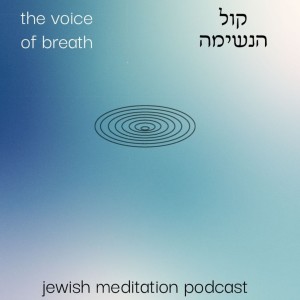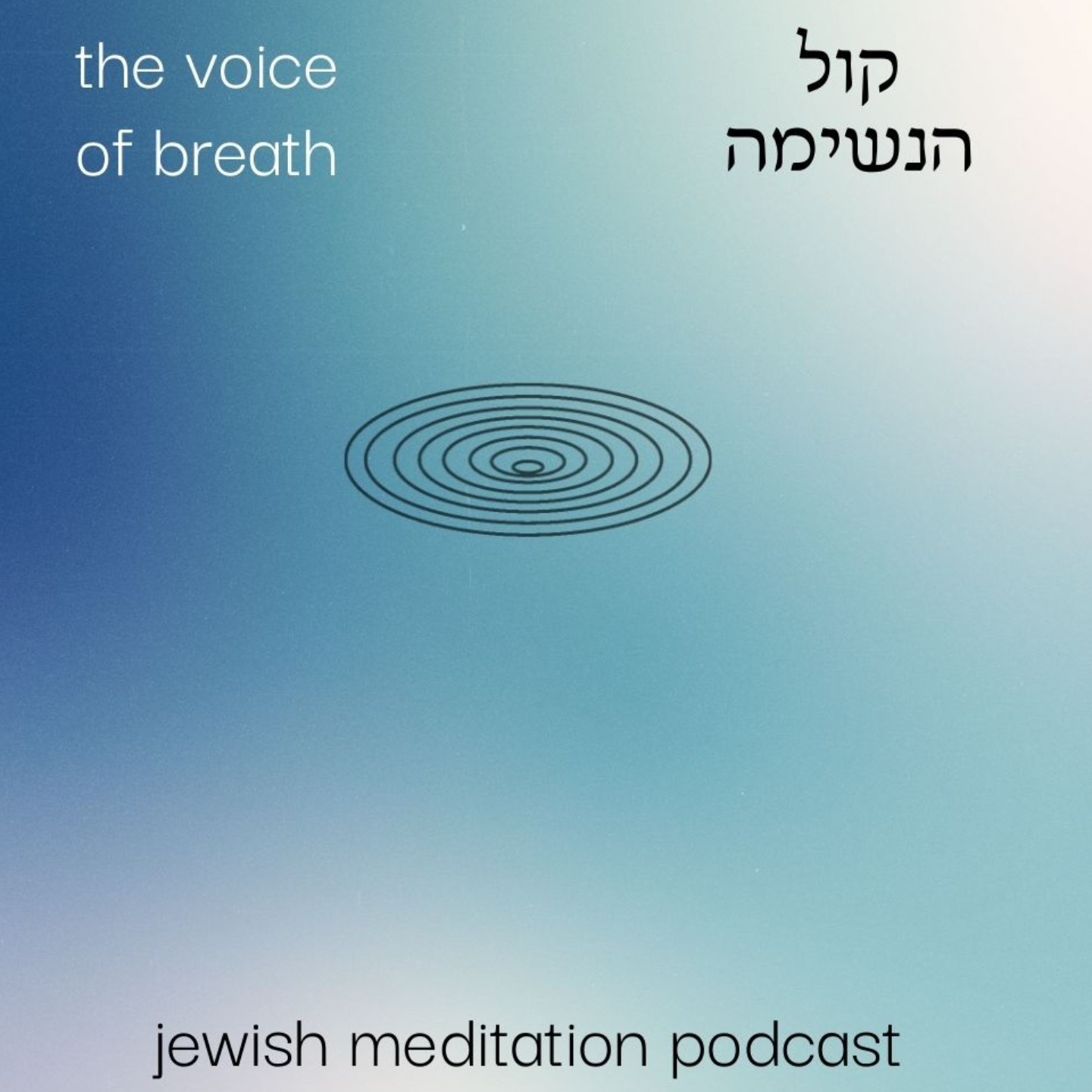Episodes

Friday Aug 20, 2021
Dr. Mira Neshama Niculescu + Hitbonenut (Contemplative meditation techniqu)
Friday Aug 20, 2021
Friday Aug 20, 2021
We sit down with Dr. Mira Neshama Niculescu and discuss her journey through Zen meditation to Jewish meditation, her studies on the JuBu phenomenon and the incredible work she does teach Jewish meditation worldwide.
(38:41) Is when the meditation begins
Dr. Mira Neshama Niculescu is a Paris -born scholar and teacher of Jewish spirituality and meditation. She received her Doctorate in Sociology of Religion from the Ecole de Hautes Etudes en Sciences Sociales in Paris and is a Post-Doctoral Research Fellow at the Hebrew University of Jerusalem and at the Center for Hebrew and Jewish Studies in Oxford.
A former Arts Fellow from the Drisha Institute of Jewish Education and a certified Experiential Jewish Educator from the Pardes Institute of Jewish Studies as a Yesod European Leader Fellow, she currently learns Torah as a rabbinic fellow at Beit Midrash Har’El in Jerusalem.
A certified Jewish Mindfulness Teacher from the Institute for Jewish Spirituality, she teaches Torah and Jewish meditation for Or HaLev, Applied Jewish Spirituality, Romemu, IJS, Moishe House, and at various institutions in Europe and in the United States.
https://www.appliedjewishspirituality.org/experiencing-jewish-meditation
https://romemu.org/about/yeshiva/
https://www.jewishspirituality.org/
https://www.friendsofroots.net/

Wednesday Aug 18, 2021
The Overview Effect: Visualizations for Ego Transcendence
Wednesday Aug 18, 2021
Wednesday Aug 18, 2021
In 1987, Frank White coined the term "The Overview Effect," describing the experience of astronauts viewing the earth from space as a unified organism. In this episode, we discuss this phenomenon, as well as share a "Visualization for Ego Transcendence," from the book "Visions of a Compassionate World," by Rabbi Menachem Eckstein.
(08:39) The meditation begins
Theme music is the song "Breathe" by Feter Hendel

Tuesday Aug 17, 2021
Moshe Hendel Feiglin and the power of the Niggun (wordless melody)
Tuesday Aug 17, 2021
Tuesday Aug 17, 2021
In this interview we sit down with dear friend Moshe Hendel Feiglin, to learn of his journey, his musical expression and the power of the Niggun (wordless melody) to transport an individual and bring them into contact with the Divine. Moshe wrote the song "Breathe," our theme song, and recorded it with his band Feter Hendel.
The episode finishes with Moshe's rendition of the Poltover Niggun

Sunday Aug 15, 2021
Duncan Trussell, the JuBu phenomenon + A Stepping into Nature Meditation
Sunday Aug 15, 2021
Sunday Aug 15, 2021
(8:32) is where the Meditation intro begins if you wish to skip over my banter ;)
In this episode we discuss the phenomenon of the JuBu (Jewish Buddhist) based upon an episode of Duncan Trussel, as well as share a brief Nature-based meditation to help ground and connect (Please note, real actual nature is not required, but certainly beneficial!)

Friday Aug 13, 2021
Bringing in Shabbat meditation
Friday Aug 13, 2021
Friday Aug 13, 2021
This brief meditation is designed to allow us to put the ups and the downs of the past week behind and embrace Shabbat. Please note it was recorded LIVE during a Zoom gathering

Thursday Aug 12, 2021
Thursday Aug 12, 2021
Rav Daniel is the rabbi of the Community of Bat Ayin, musician, spiritual guide and counselor to individuals and groups, and beloved teacher of transformative Torah. I merited to learn from Rav Daniel and his Torah has played a foundational role in who I am. I think you will understand why after hearing this interview.
(48:03) is when the first meditation begins - "There is a Place with me"
(54:26) is the second meditation - "Shehyah (Pausing)"
To learn more from this incredible teacher you can find him at:
Soundcloud - go to playlists to find shiurim and more
A beautiful video on contemplative prayer
Plus! Stay tuned for more information about the exciting SiddurLive project!
The theme music is the song "Breathe" by Feter Hendel

Wednesday Aug 11, 2021
Introduction to Rabbi Aryeh Kaplan + The Visualization of the Name of God
Wednesday Aug 11, 2021
Wednesday Aug 11, 2021
In this episode, we share some brief remarks about Rabbi Aryeh Kaplan's z"l impact on Judaism in general and Jewish meditation in specific. We also share a short visualization technique garnered from Rabbi Kaplan's classic "Jewish Meditation: A practical guide."
(06:34) The meditation begins
The theme music is the song "Breathe" by Feter Hendel

Tuesday Aug 10, 2021
Tuesday Aug 10, 2021
Today we talk with my father, Rabbi Meir Sendor, about his journey and teachers, and discuss how Jewish meditation differs from other meditative traditions. We conclude the episode with the Kabbalistic vocalization meditation of Rabbi Avraham Abulafia.
(48:32) If you wish to just listen to the meditation - There's a guide below.
Rabbi Meir Sendor, Ph.D., serves as the facilitator for Tal Orot.
After serving as the rabbinic leader of the Young Israel of Sharon for thirty-two years, Rabbi Sendor and his wife Anne moved to Tzfat, Israel in the summer of 2016. With rabbinic ordination from Yeshiva University and a doctorate from Harvard University in medieval Jewish history, with special expertise in the history of Kabbalah and Jewish philosophy, Rabbi Sendor teaches a wide range of subjects, from kabbalah, philosophy and hasidism to talmudic and biblical commentary, halakhah and ethics. He uses his three decades of experience teaching Torah and meditation in the Sharon and the Greater Boston area to implement this program in Israel.
A Brief Guide to the Basic Vocalization Meditation of Rabbi Avraham Abulafia
The most basic, essential skills in meditation practice are learning to quiet the mind, stabilize attention and expand awareness. Some people find direct methods for quieting the flow of verbal mental chatter to be difficult at first. In some cases, an indirect approach can be helpful, such as the following basic vocalization method of the thirteenth century kabbalist Rabbi Avraham Abulafia.
On the whole, Rabbi Abulafia’s meditation techniques are highly rigorous and complex. His advanced techniques involve meditations on the divine Names, requiring great purity and sanctity of mind and body. But the basic method that he describes in his manual Or HaSekhel (pp. 101-05) is accessible for everyone. As he states it, “when your mind comes to adhere to His mind that grants you mind, your mind needs to remove from itself the yoke of all alien thoughts, except for His mind that is shared between you and Him by virtue of His glorious and awesome Name.” To attain this stable awareness, the following meditation can be helpful. This is a summary of his instructions.
As general preparation, sit in a quiet and comfortable location, with your back straight, feet on the floor, hands resting on your legs. If you are sitting on the floor, let it be in a way that your back is nice and straight. Sit quietly with your eyes closed for a few minutes, clearing your mind as well as you can.
This is a vocalization meditation, in which we will be expressing the five essential vowels of Hebrew in connection with the letter Aleph, which has no sound itself. Hebrew has nine vowels, but Rabbi Abulafia notes, and the linguists agree, that there are five essential vowels. We will express them in the following order: Cholem= oh; Kamatz= ah; Tzeirei= ai; Chirik= ee; Shuruk= oo.
We take a natural, deep breath, our head in normal position facing straight ahead. Beginning with the Cholem, we express the vowel on the exhale, letting the sound ride on our breath at a comfortable volume, out to the very end of the breath. While expressing the Cholem we raise our head slowly and gently upwards (the Cholem vowel is written above the letter). Then we inhale once, through the nose (to avoid hyperventilation), as our head slowly returns to normal position. Then we express the Cholem again on the exhale, out to the end of the breath, lifting our head gently upwards. Inhale again through the nose as the head returns to normal position. We repeat the Cholem five times total, inhaling through the nose after each exhale.
Next we express the Kamatz in the same way, five times, out to the end of the breath, this time slowly and gently moving the head horizontally from right to left over the course of the exhale (this vowel is written horizontally), then back to the right on the inhale.
Next we express the Tzeirei in the same way, five times, out to the end of the breath, this time moving the head from left to right on the exhale (this vowel is also written horizontally), then back to the left on the inhale.
Next we express the Chirik in the same way, five times, out the end of the breath, this time moving the head from normal position down towards the chest on the exhale (this vowel is written as a dot under the letter), then back up to normal position on the inhale.
Finally, we express the Shuruk on the exhale, five times, out to the end of the breath, this time moving the head from normal position very slightly forward on the exhale (this vowel is written in the middle of the letter), and returning to normal position on the inhale. After the last expression of Shuruk we sit quietly for several minutes.
We have provided a recording of this meditation which you can use to follow along for the first few times, to get a feel for the sound and the pacing. A chime sounds at the beginning, to introduce a minute of silence before the vocalization series, and a chime sounds at the end, after a few minutes of silence. Throughout the meditation, you can be aware of the vibrations that each vocalization stimulates. After the vocalizations, you may find that it is relatively easy to maintain a quiet, open, attentive and stable awareness.
Rabbi Abulafia goes on to expand this meditation to include letters and vowels of the divine Name, but that’s for advanced meditators in a high state of purity. Even this basic form of the meditation, however, can be helpful towards connecting our mind with HaShem, Who grants us mind, with HaShem’s help.
Rabbi Meir Sendor, Tal Orot

Monday Aug 09, 2021
My journey to meditation, What's in a Name & Quieting Technique
Monday Aug 09, 2021
Monday Aug 09, 2021
Host Noam Sendor describes his own journey towards Jewish meditation and goes into the meaning of the name of the podcast. The show concludes with a Quieting Technique
Theme music is the song "Breathe" by Feter Hendel

Sunday Aug 08, 2021
The Voice of Breath intro episode
Sunday Aug 08, 2021
Sunday Aug 08, 2021
Welcome to the first episode of The Voice of Breath podcast, exploring authentic Jewish Meditation with some of the world's best contemporary teachers of Jewish meditation
Intro music is "Breathe," a soon to be released song by Feter Hendel

